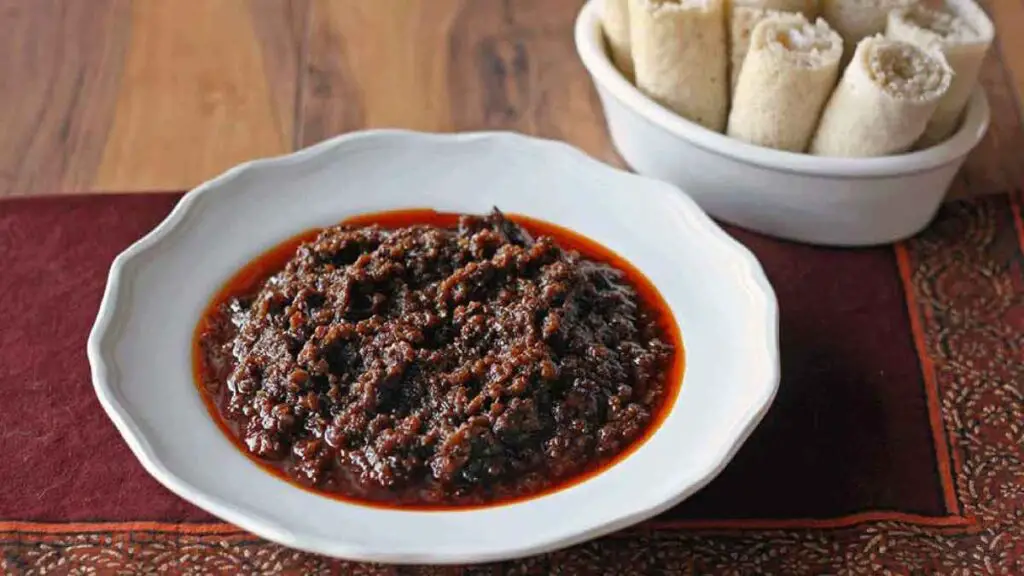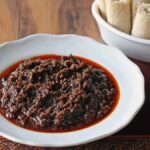There’s nothing quite like the rich, aromatic embrace of a perfectly made Key Wot. This vibrant Ethiopian beef stew, simmered to tender perfection in a deeply spiced berbere sauce, is a true cornerstone of Ethiopian cuisine and a dish I absolutely adore for its comforting warmth and incredible depth of flavor. It’s a culinary journey in every bite, promising a hearty and unforgettable meal.
Key Information
- Prep time: 30 minutes
- Cook time: 40 minutes
- Total time: 1 hour 10 minutes
- Yield: 7 servings
- Serving size: 400g
- Diet: (Please specify if vegetarian, vegan, gluten-free, etc., based on the recipe. As is, it contains beef.)
- Cuisine: Ethiopian
- Category: Main Dishes
Ingredient Highlights
- Berbere: The heart and soul of this dish, a complex Ethiopian spice mix featuring chili peppers, ginger, garlic, fenugreek, and a host of other aromatic spices. Its deep red hue and fiery, earthy flavor are unmistakable. If you can’t find pre-made berbere, you can often find individual spices at international markets to create your own blend, or look for it online.
- Mekelesha (Wot Kimem): A finishing spice blend typically added at the very end of cooking. It’s a milder, aromatic mix that often includes black cardamom, cinnamon, cloves, and nutmeg, adding a final layer of fragrant complexity. If mekelesha is hard to source, a pinch of allspice or a very small amount of garam masala can offer a somewhat similar aromatic finish, though it won’t be truly authentic.
- Onions: The generous amount might seem surprising, but they are essential for building the stew’s body and natural sweetness, slowly caramelizing to form the base of the sauce. See the full ingredient list in the recipe card below.
Equipment Needed
A large, heavy-bottomed pot or a Dutch oven is ideal for making Key Wot. Its ability to distribute heat evenly and retain warmth is crucial for the slow simmering process, ensuring the onions caramelize beautifully and the beef becomes incredibly tender without scorching. A sturdy wooden spoon or spatula will also be your best friend for stirring the thick sauce.
Step-by-Step Overview
- The journey to a perfect Key Wot begins with patience and a good deal of stirring. We start by gently simmering the finely chopped onions in vegetable oil with garlic powder. This isn’t just about cooking the onions; it’s about coaxing out their natural sugars and allowing them to slowly break down into a rich, golden-brown paste. This process, often called “dry-frying” in Ethiopian cooking (though we use oil here), is fundamental to building the stew’s body and depth. Don’t rush this step – it’s the foundation of your wot!
- Once the onions have achieved that beautiful light brown hue, it’s time for the star of the show: berbere. Adding the berbere at this stage allows its complex flavors to bloom and meld with the caramelized onions. You’ll continue to simmer and stir this vibrant mixture for a good 15 minutes, ensuring the spices are fully hydrated and their aromas are released. This is where the kitchen truly starts to smell incredible!
- After the berbere has had its moment, we introduce the water and the cubed beef. The key here is to let everything simmer gently until the beef is fork-tender. This can take a bit of time, but the low and slow cooking ensures the meat absorbs all those wonderful flavors and becomes melt-in-your-mouth soft. Keep an eye on the liquid level and stir occasionally to prevent sticking.
- Finally, just before serving, we add the mekelesha (wot kimem) and a touch more salt to taste. This finishing spice blend is added at the very end to preserve its delicate aromatics, providing a final flourish of flavor. A quick stir to incorporate it, and your Key Wot is ready to be enjoyed. The traditional way to serve Key Wot is piping hot, spooned generously over a large piece of injera, allowing the spongy bread to soak up all the delicious sauce.
Storage & Reheating Tips
Key Wot, like many stews, often tastes even better the next day as the flavors have more time to meld. Store any leftovers in an airtight container in the refrigerator for up to 3-4 days. To reheat, gently warm on the stovetop over low heat, adding a splash of water or broth if the sauce has thickened too much. You can also microwave individual portions, stirring halfway through for even heating. Avoid high heat, as it can toughen the meat.
Variations & Substitutions:
While this recipe is for traditional beef Key Wot, you can easily adapt it. For a leaner option, use chicken breast or thighs, adjusting the cooking time until the chicken is cooked through. For a vegetarian twist, you could substitute the beef with hearty mushrooms (like cremini or portobello), lentils, or even firm tofu, adjusting the simmering time accordingly. If you prefer a less spicy wot, you can reduce the amount of berbere, or for more heat, add a pinch of cayenne pepper.
FAQs
Can I freeze this?
Yes, Key Wot freezes beautifully! Allow it to cool completely, then transfer to freezer-safe containers or bags. It can be frozen for up to 3 months. Thaw overnight in the refrigerator before reheating.
What if I don’t have fresh garlic?
The recipe calls for garlic powder, which is common in some Ethiopian recipes. If you prefer fresh, use 4-5 cloves of minced fresh garlic, adding it with the onions.
My wot is too thin/thick. How do I fix it?
If it’s too thin, simmer uncovered for a bit longer to reduce. If it’s too thick, add a little hot water or broth until it reaches your desired consistency.
Where can I find berbere and mekelesha?
Look for them at African or international grocery stores, or online specialty spice retailers.
A Personal Connection to Key Wot
Key Wot holds a special place in my heart, reminding me of bustling family gatherings and the comforting aroma that would fill my grandmother’s kitchen. It’s more than just a meal; it’s a symbol of hospitality and community in Ethiopian culture. Sharing a plate of wot and injera with loved ones, tearing off pieces of bread to scoop up the rich stew, is a deeply communal and cherished experience. This recipe, passed down through generations, embodies that warmth and connection.
PrintKey Wot Recipe
Learn how to make Key Wot by using this simple recipe from Ethiopian Food Guide. Here you will learn about all the ingredients you will need to make this traditional Ethiopian dish with all the necessary directions.
- Prep Time: 30 minutes
- Cook Time: 40 minutes
- Total Time: 1 hour 10 minutes
- Yield: 7 servings 1x
- Category: Main Dishes
- Method: Simmer/Sauté
- Cuisine: Ethiopian
Ingredients
- 3 lbs (1.36kg) beef, cut into cubes
- 5 medium (550g total) finely chopped onions
- 2 tsp (4g) mekelesha (wot kimem)
- ¼ cup (20g) berbere
- 5 tsp (10g) garlic powder
- 2 tsp (4g) ginger powder
- 2 tsp (10g) salt
- ½ cup (120ml) water
- 2 cups (480ml/440g) vegetable oil
Instructions
- Start by simmering the onions in a large-sized pot with garlic and vegetable oil until the mix turns light brown, at low heat.
- Then, add the berbere and continue simmering for 15 more minutes, while stirring every now and then.
- Next, add water and the cubed beef and let them simmer until the meat is done.
- Finally, add the mekelesha (wot kimem) and some salt, and stir for just a bit more. Serve your key wot hot, on a plate with injera spread over the top.
Nutrition
- Serving Size: 400g
- Calories: 650-700 kcal
- Sugar: 5-7g
- Sodium: 700-800mg
- Fat: 50-55g
- Saturated Fat: 7-8g
- Unsaturated Fat: 40-45g
- Trans Fat: 0g
- Carbohydrates: 10-12g
- Fiber: 2-3g
- Protein: 38-40g
- Cholesterol: 120-130mg

